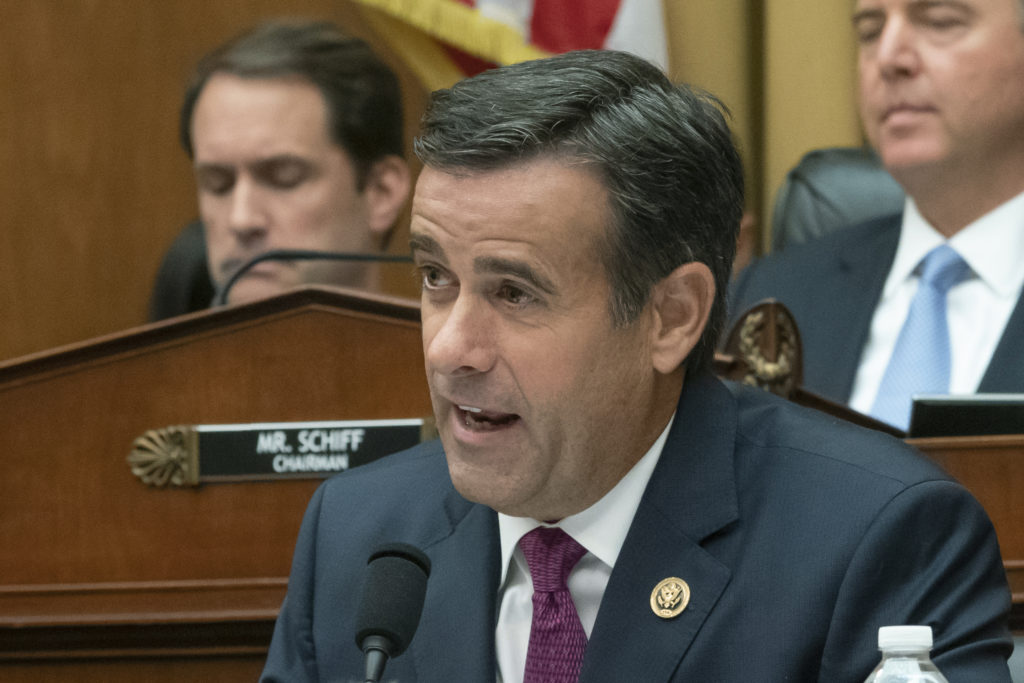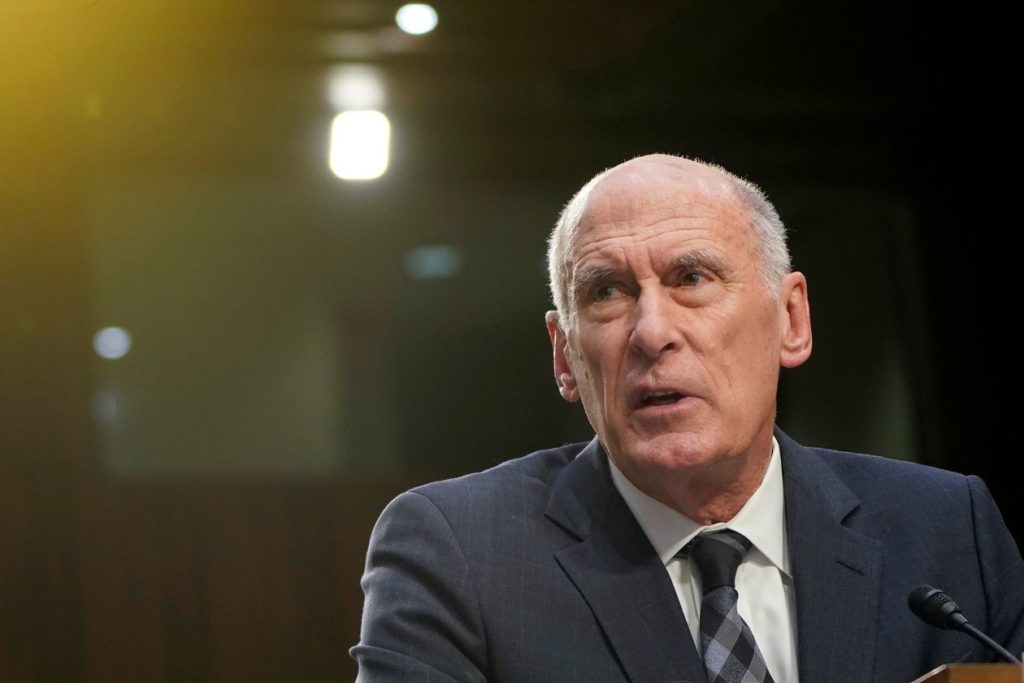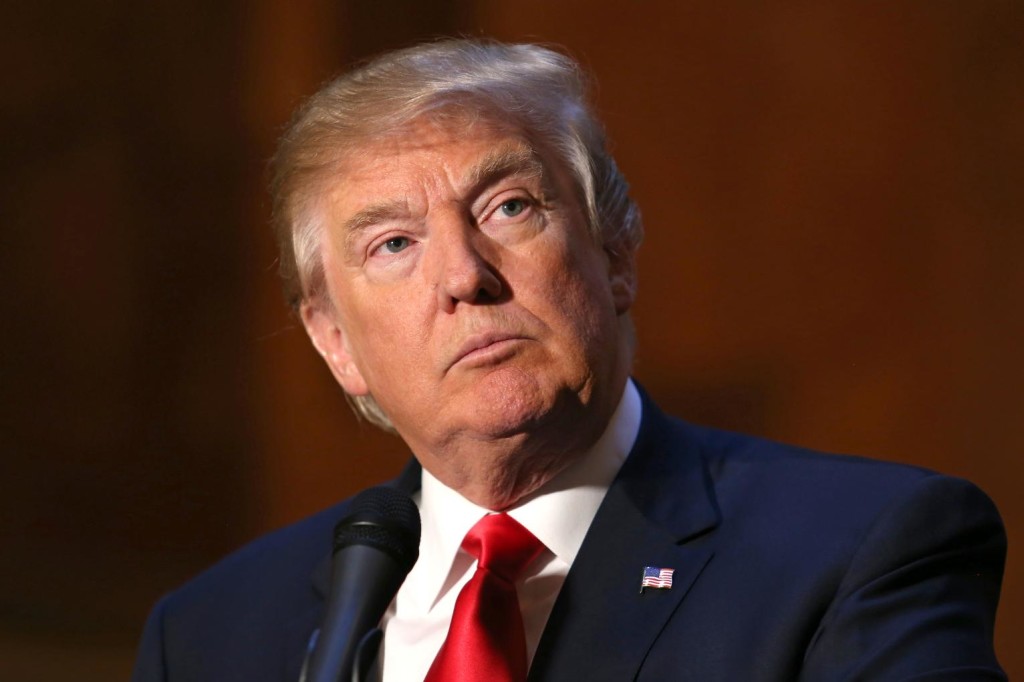Doubts emerge about Donald Trump pick for U.S. intelligence chief

President Donald Trump’s pick for national intelligence director has been mayor of a small Texas city, a federal prosecutor and a member of Congress. But questions were already emerging Monday about whether those qualifications are adequate for the position as the nation confronts threats that include foreign election interference, North Korea’s nuclear ambitions and the risk of war with Iran. Republican Rep. John Ratcliffe is also known as a Trump loyalist, which makes his lack of relevant experience even more striking at a time when current and former government officials expect Russia to look to interfere in the 2020 presidential election just as it did in unprecedented fashion when Trump first ran. “Ratcliffe comes to the job with the least national security experience and the most partisan political experience of any previous director of national intelligence,” said Michael Morell, a former acting CIA director who now hosts the “Intelligence Matters” podcast. The director of national intelligence has oversight of the nation’s 17 intelligence agencies, a significant job touching all corners of national security policymaking. If confirmed, Ratcliffe would be the principal intelligence adviser to Trump, who has appeared determined to surround himself with vocal protectors and defenders even in national security positions that haven’t historically been perceived as overtly partisan. It is unclear what specific experience Ratcliffe will bring in helping thwart foreign government efforts to interfere in American politics. Also unknown is whether skepticism he has voiced in Congress about special counsel Robert Mueller’s investigation into ties between Russia and the Trump campaign will affect his preparation for, or response to, any foreign influence or cyberattacks on campaigns. Ratcliffe, who was among the most aggressive Republican questioners of Mueller at public hearings last week, would replace outgoing director Dan Coats at a time of broader reshuffling within the national security leadership structure. “It’s a moment when Donald Trump can deepen his personal stranglehold over the intelligence function and knock out any voices of dissent to his particular worldview,” said Democratic Rep. Jamie Raskin of Maryland. “That’s a scary thing for the country.” The selection comes months after Trump empowered another ally, Attorney General William Barr, to disclose still-secret intelligence collected by other agencies as part of the Russia investigation. Ratcliffe has made clear his skepticism of that investigation and his belief that Trump was treated improperly by investigators, saying in a talk show appearance Sunday that it was time to move on from discussion of impeachment. Coats, who will step down next month, repeatedly clashed with Trump. He was publicly steadfast about his conviction that Russia had interfered in the election even in the face of the president’s ambivalence. He appeared to scoff when told in an interview that Trump had invited Russian President Vladimir Putin to Washington. And in his resignation letter, he cited as an accomplishment the appointment of an election security executive “to support the whole-of-government effort to address threats against our election.” Tensions with Trump notwithstanding, Coats did bring to the job decades of Washington experience, including lengthy stints as an Indiana congressman and U.S. ambassador to Germany. His predecessor in the Obama administration, James Clapper, spent decades in the military and in intelligence, including as director of the Defense Intelligence Agency.Ratcliffe does not have equivalent credentials, though his supporters are likely to point to his experience as a prosecutor as well as his recent membership on the House Intelligence Committee, which he joined in January. Ratcliffe was first elected to Congress in 2014, and his experience as top federal prosecutor in east Texas gave him instant clout when Republicans ran the Judiciary panel. He was one of the main questioners when Republicans hauled in Justice Department officials to question them about whether they were biased against Trump in the early days of the FBI’s Russia probe. It’s unclear whether concerns about his credentials will trip up the confirmation process. Confirmation takes a simple 51-vote majority, under new rules in the Senate, but that leaves slim room for error with Republicans holding a 53-seat majority. Sen. Richard Burr, the Republican chairman of the Senate Intelligence Committee, said Monday that he would move swiftly to push the nomination through his panel. “I don’t have any concerns,” he told reporters. Several Republicans on the intelligence panel said they didn’t know Ratcliffe and would wait to meet with him. “I’m open on this,” said Missouri Sen. Roy Blunt. Maine Sen. Susan Collins, a critical swing vote for the GOP who sits on the panel, said the job is very important to her because she co-wrote the legislation that created it 15 years ago. She said she had never heard of Ratcliffe before last week, so she couldn’t comment on his qualifications, but she said she cares deeply “about having an independent, well-qualified individual in that post.” Republican Sen. John Cornyn, another member of the committee, said that his Texas colleague is a “tremendous human being” and that he is “confident he can rise to the challenge.” Democrats were immediately critical. The committee’s top Democrat, Sen. Mark Warner of Virginia, said Ratcliffe’s questioning at the Mueller hearings “raises huge questions in my mind” about his ability to be independent. Even before Mueller testified, Trump had his eye on Ratcliffe, who had already established himself as an outspoken defender of the president and raised Trump-backed questions about the conduct of the intelligence community in the Russia probe. But two officials said his aggressive questioning of the former special counsel cemented the president’s view that he was the right person for the job. Last Wednesday, he told Mueller that while he accepted that Russia’s interference was “sweeping and systematic,” he was also concerned about how much intelligence came from an ex-British spy who received Democratic funding to investigate Trump and whose research helped form the basis of a secret surveillance warrant to monitor the communications of a former Trump campaign aide. He pointedly accused Mueller of departing from the special counsel’s own rules by writing “180 pages about decisions that
Dan Coats will leave his job as national intelligence director

Dan Coats, director of national intelligence, will leave his job next month, President Trump announced, after a turbulent two years in which Coats and the president were often at odds over Russian interference in the 2016 election. Trump announced Coats’ departure as Aug. 15 in a tweet on Sunday that thanked Coats for his service. He said he will nominate Rep. John Ratcliffe, Republican-Texas, to the post and that he will name an acting official in the coming days. Ratcliffe is a frequent Trump defender who fiercely questioned former special counsel Robert Mueller during a House Judiciary Committee hearing last week. Coats often appeared out of step with Trump and disclosed to prosecutors how he was urged by the Republican president to publicly deny any link between Russia and the Trump campaign. The frayed relationship reflected broader divisions between the president and the government’s intelligence agencies. Coats’ public, and sometimes personal, disagreements with Trump over policy and intelligence included Russian election interference and North Korean nuclear capabilities. Trump had long been skeptical of the nation’s intelligence agencies, which provoked his ire by concluding that Russia interfered in the 2016 presidential election with the goal of getting him elected. In a letter of resignation released Sunday night, Coats said serving as the nation’s top intelligence official has been a “distinct privilege” but that it was time for him to “move on” to the next chapter of his life. He cited his work to strengthen the intelligence community’s effort to prevent harm to the U.S. from adversaries and to reform the security clearance process. A former Republican senator from Indiana, Coats was appointed director of national intelligence in March 2017, becoming the fifth person to hold the post since it was created in the wake of the Sept. 11, 2001, attacks to oversee and coordinate the nation’s 17 intelligence agencies. Coats had been among the last of the seasoned foreign policy hands brought to surround the president after his 2016 victory, of whom the president steadily grew tired as he gained more personal confidence in Oval Office, officials said. That roster included Defense Secretary Jim Mattis and Secretary of State Rex Tillerson, and later national security adviser H.R. McMaster. Coats developed a reputation inside the administration for sober presentations to the president of intelligence conclusions that occasionally contradicted Trump’s policy aims.His departure had been rumored for months, and intelligence officials had been expecting him to leave before the 2020 presidential campaign season reached its peak. Sen. Mark Warner of Virginia, the ranking Democrat on the Senate’s intelligence committee, tweeted Sunday: “The mission of the intelligence community is to speak truth to power. As DNI, Dan Coats stayed true to that mission.” Senate Majority Leader Mitch McConnell said he was sorry to see Coats leave and praised him, saying he had been reassured knowing that such a man as his former Senate colleague who “took such a deliberate, thoughtful, and unbiased approach was at the helm of our intelligence community.” Trump’s announcement that Coats would be leaving came days after Mueller’s public testimony on his two-year investigation into Russian election interference and potential obstruction of justice by Trump, which officials said both emboldened and infuriated the president. Coats had been among the least visible of the president’s senior administration officials but, in his limited public appearances, repeatedly seemed at odds with the administration, including about Russia. For instance, he revealed to Mueller’s investigators how Trump, angry over investigations into links between his campaign and Russia, tried unsuccessfully in March 2017 to get him to make a public statement refuting any connection. “Coats responded that the Office of the Director of National Intelligence (ODNI) has nothing to do with investigations and it was not his role to make a public statement on the Russia investigation,” Mueller’s report said. Trump later called Coats to complain about the investigation and how it was affecting the government’s foreign policy. Coats told prosecutors he responded that the best thing to do was to let the investigation take its course. In February, he publicly cast doubt on the prospects of persuading North Korea to end its nuclear weapons program despite the diplomatic efforts of the administration, which has touted its outreach to the isolated country as one of its most important foreign policy achievements. Coats, in testimony to Congress as part of annual national intelligence assessment, said North Korea would be “unlikely” to give up its nuclear weapons or its ability to produce them because “its leaders ultimately view nuclear weapons as critical to regime survival.”Trump publicly bristled at the testimony of Coats, the head of the CIA and other officials who contradicted his own positions on Iran, Afghanistan and the Islamic State group as well as North Korea. The intelligence officials were “passive and naive,” he said in a tweet.Last July, Coats and the president appeared at odds following Trump’s widely panned news conference in Helsinki alongside Russian President Vladimir Putin. Trump said he saw no reason to believe Russia had interfered in the 2016 election, drawing bipartisan criticism and a rebuttal from his intelligence chief. “We have been clear in our assessments of Russian meddling in the 2016 election and their ongoing, pervasive efforts to undermine our democracy, and we will continue to provide unvarnished and objective intelligence in support of our national security,” Coats said.The president later said he misspoke in Helsinki. That same month, Coats appeared to scoff when told in an interview that Trump had invited Putin to Washington. “Say that again,” Coats said, cupping his hand over his ear on live television. He took a deep breath and continued: “OK. That’s going to be special.” He later said his comments at the Aspen Security Forum in Colorado were “in no way meant to be disrespectful or criticize the actions of the president.” In December, Coats said he was “deeply saddened” when Mattis resigned in protest of Trump’s foreign policy, including the decision to withdraw American troops from Syria. Coats called Mattis a
Donald Trump receives first classified intelligence briefing

Donald Trump has received his first classified intelligence briefing, meeting with national security officials for more than two hours on Wednesday. The celebrity businessman became entitled to the briefings once he officially became the Republican nominee for president. The briefing was delivered by career staffers from the Office of the Director of National Intelligence and was expected to cover major threats and emerging concerns around the world. The afternoon briefing was held at an FBI field office at a federal building in New York City, a facility which has the secure rooms required for such sensitive briefings. Trump did not speak to reporters upon entering or exiting the building and a campaign spokeswoman did not immediately respond to a request for comment about the briefing. But Trump, in an interview that aired just hours before the briefing, suggested he would be skeptical of its contents when he was asked if he trusted the nation’s intelligence materials. “Not so much from the people that have been doing it for our country,” Trump told Fox News. “I mean, look what’s happened over the last 10 years…it’s been catastrophic.” Trump brought along some top advisers, including New Jersey Gov. Chris Christie and Lt. Gen. Michael Flynn, to the briefing. A U.S. intelligence official said that generally, advisers who attend the briefings must have appropriate security clearances. The official spoke on condition of anonymity because he wasn’t authorized to disclose information about the candidates’ intelligence briefings. Defense Intelligence Agency says that the agency maintains security clearances for all its former directors, including Flynn, who served in the post from 2012-2014. The briefing came two days after Trump delivered a speech on national security and just hours after he gathered several advisers for a security round table at Trump Tower. The advisers, including former New York City Mayor Rudy Giuliani, encouraged the GOP nominee to press for more surveillance and more information-sharing with local police departments to fight terror threats if he’s elected president. The FBI does share with local police agencies through Joint Terrorism Task Forces. It wasn’t clear whether Democrat Hillary Rodham Clinton has received an intelligence briefing. Republished with permission of the Associated Press.


